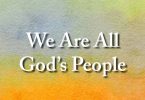Advent 4: December 20, 2020
Topic: Mary’s Song
Text: Luke 1:47-55
Amy Gohdes-Luhman
- Introduction (5 min.)
- Fourth Session “Mary’s Song”
- Story Sharing James McGee and Ivy Summers
- Scripture Luke 1:47-55
Review of Handout – Rules for Respectful (Faithful) Conversation
Opening Prayer, Scripture, Reflection and Discussion Question ( 5 min.)
Mary’s voice lifts up her experience of the world’s brokenness as it is. Her song also gives voice to the world as it should/could be. Her experiences stand in stark contrast to conventional notions of being blessed. She is a young woman from a peasant class. Her gender makes her especially vulnerable, especially for a woman with questions surrounding her pregnancy. Mary’s yes to God’s calling brings new tensions into her life yet she claims a blessed state for God is doing great things and she is part of that. Her song is about a God who disrupts unjust systems and structures here and now. Mary voices the work of God in a social leveling and moves away from the have/have not systems we still tolerate today. Though Mary’s song speaks to the real world as it is, it is a song of hope and points to a new way of being community for God is lifting up the lowly, God is filling the hungry with good things, God is scattering the proud, bringing the powerful down from their thrones and sending the rich away empty. This is not a song about reversals of fortune but a leveling where privileges are not assigned to a few at the expense of others. This song points to an equitable sharing in the abundance of resources and life God desires for all. It is a song that still rings out every Advent and Christmas time reminding us that we’re not there yet.
- Bring to mind the communities you share life with… name a place of brokenness, name a place of hope.
Story Sharing: James McGee and Ivy Summers (20 minutes)
For Week 4: Story Sharing with James McGee and Ivy Summers from IBOC • Mike Riess on Vimeo.
- What are your initial reactions to Ivy and James’ story?
Discussion and Reflection (15-20 min)
Ivy and James give voice to the very real burdens of living as people of color in our communities. They speak to the world’s brokenness as it is. James shares “I understand that any interaction that I have with somebody in law enforcement could be the end of my life and the saddest thing is that I’m resigned to that.”
James also spoke of the “talk” his father gave him and he has had to have with his daughter about living as a black person in this country. Ivy spoke of her son having a pocket knife in his vehicle and having to point out to him the dangers of having this as a person of color. Ivy speaks of the emotional labor and exhaustion of being a person of color in our communities.
- How do you connect or empathize with their story?
- What changes could be made to create safer communities for all our youth and children?
- What spiritual, physical and emotional impacts can come from bearing such emotional labor?
James and Ivy’s story gives voice to hope and the world as it could/should be. James says “Listen to the experiences of people of color when they tell you something is not right.” He speaks about listening without rebuttal or dismissiveness. Ivy speaks about it not always helpful to be around people just like me and the importance of listening to others experiences.
- Bring to mind your experiences have not really been “heard” by another. How does that feel?
- What are ways we can listen and hear the stories of people in our communities?
Ivy shares “the reason I love being a Moravian is Love… In all things Love… I keep turning to that.”
She shares her hope that our denomination grows in diversity and would love to see our congregation be more diverse as this is good, healthy and would make our congregation stronger.
- How do you see the work of racial justice living out our Moravian calling and motto “In All Things Love?”
- In what ways can we embrace diversity as a strength?
Closing Words and Prayer (3 min.)
“Jesus crossed every barrier between people, including the greatest barrier of all—the division between God and humankind. He is our peace, and because of his life, death, resurrection, and coming return, those who believe in Jesus not only have God’s presence with us but in us through the Holy Spirit. Therefore, we have the power, through God to leave behind the compromised Christianity that makes its peace with racism and to live out Christ’s call to a courageous faith.” Jemar Tisby The Color of Compromise”




